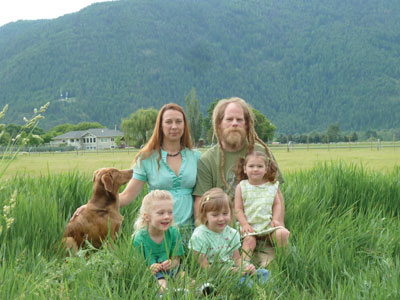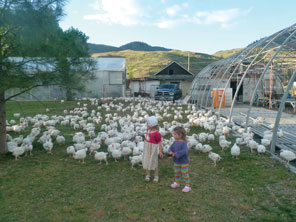6/29/2015
Embracing the Adventure of Agriculture
Anne-Marie Hardie

Danna O’Donnell has been gardening for most of her life. Growing up in Bond Head, Ontario, she spent her summers working on the farm picking strawberries, beans and peas. To Danna, working in horticultural was an obvious career choice, and she shares that the same holds true for her husband, Brandon. These two green thumbs have an incredible entrepreneurial spirit, so when they dreamed of expanding from their small horticultural services business into farming, they went for it.
It was 2001. Brandon and Danna came across an old historic farm in Grand Forks, British Columbia. The property was severely neglected and in the process of deterioration—to the point that most individuals would have turned their heads and left. But these out-of-the-box thinkers were able to see the opportunity hidden amongst the weeds, garbage and waist-high grass.
Pictured above:Danna and Brandon O’Donnell (shown with their children Mikah, Odessa and Elka) own O’Donnell’s Farm in Grand Forks, British Columbia.
Pictured below: Recently, the O’Donnells transformed their retail area into a chicken production site, so instead of selling flowers, they sell frozen chickens and eggs. They still sell organic vegetables as well. That’s 4-year-old twins Mikah and Odessa looking on.
“The farm had gone through a bank foreclosure and was sitting for a couple of years. And it was getting in rough shape,” said Danna.
In the beginning, Danna describes the venture as far from an easy one. The plastic on the 100-ft. greenhouse was torn and flapping in the wind. Garbage was strewn throughout the property and was overflowing in the barn. Virtually everything had been abandoned and was deteriorating.
Danna and Brandon worked together to make the farmhouse livable, from the plumbing to pumping out the septic tanks. Their goal was a lofty one: to have the greenhouse operation up and running by spring. This gave the O’Donnells only the winter to get the business going, which included cleaning the old fruit stand and a garden retail space so they were ready for the public.
Through the combination of hard work, perseverance and the receipt of micro loans from their local communities’ Futures, they accomplished their goal. That first year, O’Donnell’s Farm grew more than 200 varieties of flowers and vegetables, ranging from alyssum and zinnia to arugula and zucchini.
“The retail garden space was quite a large area, 60 ft. by 100 ft., and we did our best to get it filled,” said Danna. Everything was grown organically, with the O’Donnells using only the methods that were authorized by the certified organic program. As the years passed, the business continued to evolve, adding on another greenhouse for commercial production of hothouse peppers, tomatoes and cucumbers.

However, with the introduction of a larger box store to the area and the need to balance farm life with young children, it became harder and harder to compete for that retail consumer. And so the O’Donnells made the decision to close their storefront and reflect on what other agriculture ventures they could get into. Not intimidated by change, Danna and Brandon converted their storefront into a chicken production site with a small flock permit, while the organic vegetable production was reduced to a few crops—mainly tomatoes, squash, pumpkins and pickling cucumbers.
One additional benefit of adding livestock to their growing operation is that the O’Donnells now have access to nutrient rich compost.
“We use the floor litter and the manure that the chickens produce in there, we compost it and it gets taken out to our market garden. It’s a good little system,” said Danna.
This year they’re also experimenting with the Native American “Three Sisters Garden.” In this special garden, corn, pole beans and squash are planted side by side. The belief is that these three crops seamlessly work together so that they all thrive, from the corn providing a pole for the beans to grow for the squash that blocks out the weeds.
With the conversion of the retail store to a chicken coop, the O’Donnells sell their wares offsite using Farm Gates, their Facebook page, a local co-op and the Kettle Valley Food Cooperative.
“We also do farmer’s markets when we have an overflow,” said Danna. “If we’ve done a big chicken harvest, then we will put our freezers in the back of the truck and bring our canopy and set up in the local farmer’s market and sell frozen chickens and whatever else happens to be on hand.”
Facebook has become a very successful market. Their page was launched just over a year ago from a need to increase revenue.
“We decided to presell birds and take orders, using primarily social media,” said Danna. “I pretty much had our stuff sold out with deposits before it was even ready.”
With more than 300 likes, Facebook has provided the O’Donnells the ideal venue to share the activities on the farm, while securing advanced sales. It has also provided an outlet to sell the O’Donnells’ laying hens, another project that Danna and Brandon eagerly dove into.
For additional income, the O’Donnell’s Farm is also home to the community mobile slaughterhouse, Boundary Country Meat Works.
“Brandon manages it on a volunteer basis, but we do the processing also. Our off-farm job is ideal because the abattoir [slaughterhouse] is still on the farm,” said Danna. This processing facility enables the community to grow meat and be able to process it locally, avoiding adding on food miles and stressing the animals by having to get them shipped.
Despite all of the changes, or perhaps because of them, the O’Donnells are still in love with farming. Brandon and Danna provide the perfect balance to each other, each taking on their own roles, while enthusiastically discovering their next learning opportunity. Always up for an adventure, the O’Donnells continue to explore the possibilities that grow around them, from tapping their local maple tree for syrup to discussions about adding sheep to their farm. The hopes for the future are to keep learning and growing, starting with adding on a fence to their rest of the property, so that they can keep out the deer and expand their vegetable production.
GT
Anne-Marie Hardie is a freelance writer/speaker from Barrie, Ontario, and part of the third generation of the family-owned garden center/wholesale business Bradford Greenhouses in Barrie/Bradford, Ontario.